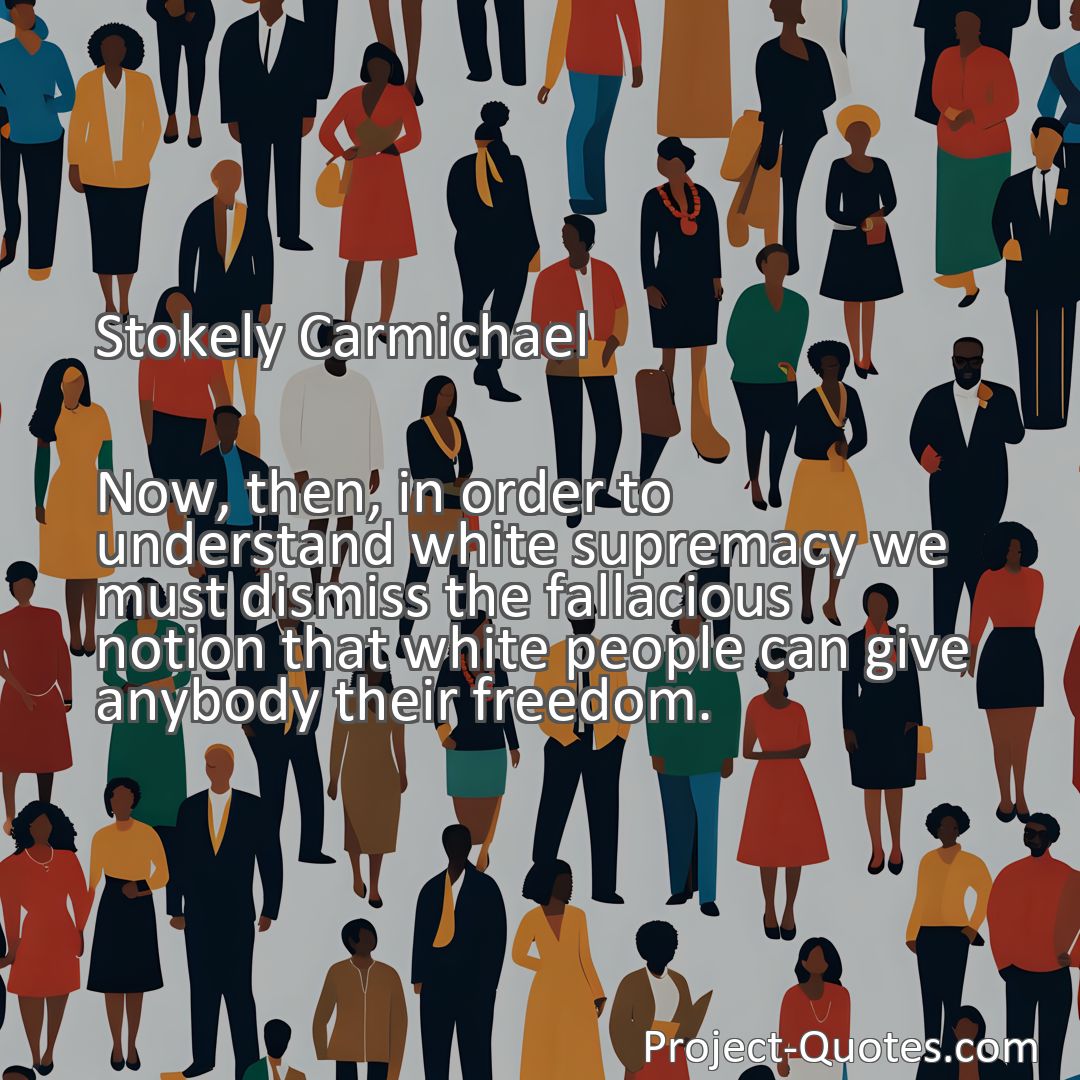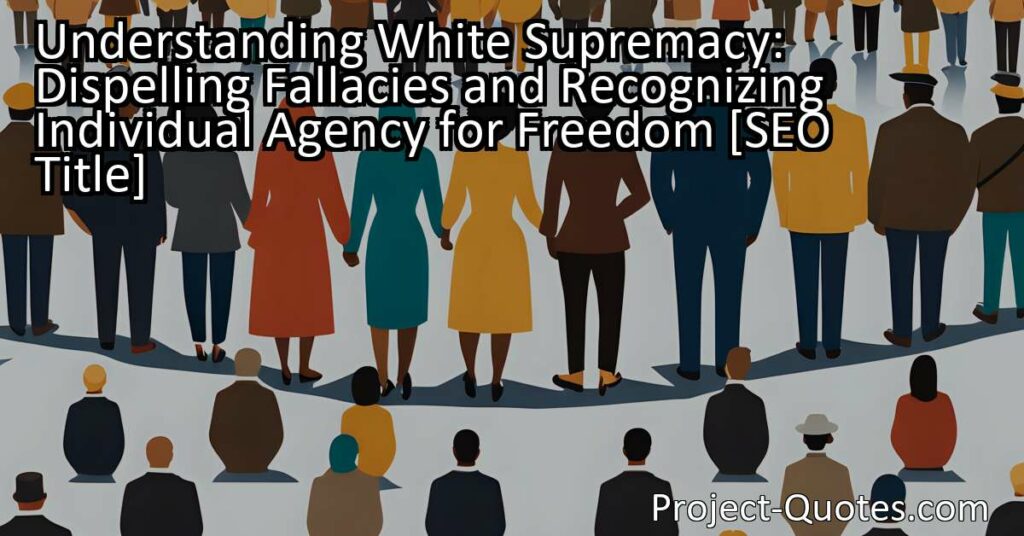Now, then, in order to understand white supremacy we must dismiss the fallacious notion that white people can give anybody their freedom.
Stokely Carmichael
the complex nature of this social construct and its impact on both the individual and systemic levels. By acknowledging the fallacy of white people granting freedom and embracing individual agency, we can actively work towards dismantling white supremacist structures and promoting a more equitable society. Together, we have the power to challenge oppressive systems and strive for a future that values freedom, equality, and justice for all.
Table of Contents
- 1 Now, then, in order to understand white supremacy we must dismiss the fallacious notion that white people can give anybody their freedom.
- 2 Stokely Carmichael
- 3 Meaning of Quote – Now, then, in order to understand white supremacy we must dismiss the fallacious notion that white people can give anybody their freedom.
- 4 Freely Shareable Quote Image
- 5 Related
Meaning of Quote – Now, then, in order to understand white supremacy we must dismiss the fallacious notion that white people can give anybody their freedom.
Understanding White Supremacy: Dispelling Fallacies and Acknowledging Freedom
Introduction :
In his thought-provoking statement, civil rights activist Stokely Carmichael challenges the flawed belief that white people hold the power to grant freedom to others. By dissecting the concept of white supremacy, this essay aims to deepen our understanding of this social construct and highlight the importance of recognizing individual agency in the pursuit of freedom.
Defining White Supremacy :
White supremacy refers to a system of beliefs and practices that upholds the notion of white superiority and dominance over people of other races. It promotes discrimination, inequality, and the marginalization of non-white individuals in various aspects of life, including politics, education, employment, and social interactions. The roots of white supremacy can be traced back to slavery and colonialism, where the power dynamics between white colonizers and enslaved individuals were starkly unequal.
The Fallacy of White People Granting Freedom :
Carmichael astutely points out the fallacy in believing that white people possess the ability to grant freedom to others. This notion perpetuates a power imbalance and stifles the individual agency of those seeking liberation. History is rife with examples of marginalized groups fighting tirelessly for their rights and freedom from oppressive systems. From the African American civil rights movement to the struggles for indigenous rights, history provides a clear testament to the fact that freedom is not a gift bestowed by any single racial group.
Instead, true freedom must be obtained through collective efforts and resistance against oppressive systems. White people, who have historically held positions of power and privilege within white supremacist structures, must acknowledge their role in dismantling these systems and actively work to challenge and uproot them.
The Complexities of White Supremacy :
Understanding white supremacy requires recognizing its intricate nature and the ways it operates on both individual and systemic levels. While white supremacy assigns value and power to individuals based on their race, it also perpetuates harmful stereotypes and prejudices that disproportionately target marginalized communities.
Moreover, white supremacy operates through a myriad of interconnected systems, such as education, criminal justice, and housing, perpetuating disparities and hindering upward mobility for non-white communities. Recognizing these complexities is crucial in dismantling white supremacist structures and promoting a more equitable society.
It is vital to emphasize that the rejection of white supremacy does not imply a condemnation of white individuals as inherently racist. Rather, it highlights the need for introspection and collective action toward dismantling oppressive systems that continue to perpetuate inequality and restrict freedom for people of color.
Challenging White Supremacy: Individual and Collective Responsibility :
Dispelling the notion that white people possess the power to grant freedom unveils the importance of individual and collective responsibility in challenging white supremacy. The fight against systemic oppression necessitates a collective effort involving people from all racial backgrounds. By understanding their privilege, white individuals can actively engage in allyship, amplify marginalized voices, and work toward dismantling white supremacist structures.
Education plays a pivotal role in cultivating awareness and empathy among all individuals. Incorporating inclusive learning materials and promoting transparent conversations about race within schools can foster an environment that challenges and undo the harm perpetuated by white supremacy.
Furthermore, tackling white supremacy requires dismantling systemic barriers that perpetuate racial inequality. Advocating for policies that address socioeconomic disparities, combating discrimination within the criminal justice system, and ensuring fair access to affordable housing are crucial steps toward fostering a more equitable society.
Conclusion :
In Stokely Carmichael’s quote, he urges us to critically examine the notion that white people hold the key to granting freedom. By doing so, we begin to understand the inherent fallacy of this belief and recognize the power dynamics rooted in white supremacy. Empowered by this knowledge, we can collectively challenge oppressive systems and work toward a future that embraces freedom, equality, and justice for all.
I hope this quote inspired image brings you hope and peace. Share it with someone who needs it today!


